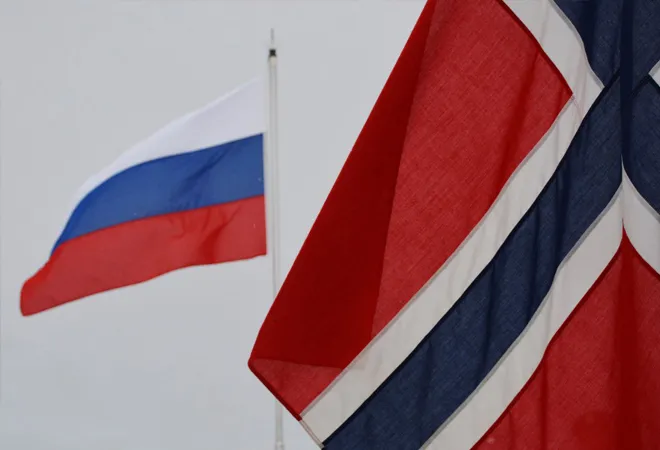
In May 2023, Norway took over the chairship of the Arctic Council for 2023-2025 from Russia. Its chairship comes at a time when the geopolitics of the Arctic is changing due to the conflict in Ukraine. While the Arctic Council is not a security- or politically-driven intergovernmental forum, however, the ramification of the crisis has been felt in the region primarily because Russia constitutes the biggest country in the Arctic. Seven
<1> of the eight members had temporarily
paused the working of the Arctic Council in March 2022 as a response to Russia’s actions in Ukraine. While a
partial resumption of working of the Council was initiated in June 2022, it was largely limited to the areas where Russia was not involved. This article analyses the priorities presented by Norway for its two-year chairship of the Council.
Norway’s Priorities
Established in 1996, the Arctic Council aims to promote cooperation and intergovernmental coordination among the eight circumpolar countries on the Arctic’s sustainable development and environmental protection issues. The key focus of the Council has been to work on areas that are low in politics and avoid getting involved in contentious political and security issues. In its
Arctic Council Strategic Plan 2021-2030, the mandate for the Council was defined as “to maintain the Arctic as a region of peace, stability, and constructive cooperation, that is a vibrant, prosperous, sustainable, and secure home for all its inhabitants, including Indigenous Peoples, and where their rights and wellbeing are respected.” Following the idea of keeping high politics out, the Norwegian government defined its priorities within the framework of the following
four policy areas:
While the Arctic Council is not a security- or politically-driven intergovernmental forum, however, the ramification of the crisis has been felt in the region primarily because Russia constitutes the biggest country in the Arctic.
First, the oceans, where the emphasis is laid on the pressure on the marine environment and the need to promote sustainability in the Arctic Ocean’s industry. Under this, Norway will work with partners to develop tools for Arctic management and protect ice-dependent species and ecosystems. Moreover, as the Arctic is increasingly losing its polar ice caps, Oslo called for the need to enhance emergency prevention, preparedness, and response in the Arctic. For this, it will strengthen cooperation with the Arctic Coast Guard Forum and work with other partners on aeronautical and maritime search and rescue, oil-spill preparedness and response, and radiological and nuclear contamination at sea.
Second is climate and environment—as the Arctic is heating more rapidly than expected, Norway’s chairship has placed importance on addressing the twin challenges of dealing with environmental issues due to human activities and adapting a management system for climate change. This is to be addressed by enhancing the knowledge base of the Arctic climate and environment and by improving access to and use of Arctic data. Emphasis was also placed on reducing black carbon and methane emissions, which can prevent the acceleration of permafrost thawing.
Third is sustainable economic development, within which the blue economy, sustainable shipping, green transition, and arctic food systems have been highlighted as priorities by the government. Oslo will work with the Arctic Economic Council to strengthen economic cooperation and encourage sharing of best practices, new technological solutions, and standards for Arctic industries. Interestingly, Norway will also emphasise the traditional knowledge of indigenous people for sustainable economic development and adaptation to climate change at the local level.
As the Arctic is increasingly losing its polar ice caps, Oslo called for the need to enhance emergency prevention, preparedness, and response in the Arctic.
Following this is the fourth priority of People in the North. As climate change alters the living patterns of Arctic communities and impacts their livelihood, Norway
seeks to “develop resilient, diverse and inclusive Arctic communities that are attractive places to live in, for everyone.” The chairship’s focus would be on the youth by including them in the working of the Council and giving them a platform under the Arctic Youth Conference. It has also co-related the impact of climate change on public health in the Arctic. To study and investigate this phenomenon, Norway hopes to establish a “network of Arctic human biobanks” through cooperation with the Arctic states.
Managing geopolitics in the Arctic
One of the biggest achievements of the Arctic Council is that it brought on to a single platform the key stakeholders of the region as permanent participants, including the nations, the indigenous people, and communities. This has led to its distinctive identity where not only the two halves of the Arctic (Russia and the West) cooperate, but also indigenous perspectives are incorporated to address the Arctic issues. The Council, in the past two and a half decades, has been responsible for highlighting and framing critical issues such as climate change on the policy agendas. It has launched various working groups, initiatives, and projects such as marine biodiversity monitoring or the Arctic Migratory Birds Initiative to promote cooperation. Over the years, it has expanded to include non-Arctic states and non-state actors as observers and, in the process, has emerged as the foremost forum for conversations and cooperation on Arctic issues.
The suspension of work of the Council in March 2022 led to the erosion of the idea of cooperation on non-security matters and keeping geopolitical rivalries out.
However, in the past few years, the increasing divergences between Russia and the West have resulted in heightened tensions in the Arctic. There is an increasing tendency to view Arctic issues through the prism of high politics, thereby, putting security considerations over sustainable development. The Ukraine crisis has led to a renewed conversation on the
securitisation of the Arctic as a result of deteriorating relations between the West and Russia. While the Arctic is not new to geopolitical contestations, the Arctic Council has not necessarily been the platform for these divergences and for undermining the governance structures of the Council. The suspension of work of the Council in March 2022 led to the erosion of the idea of cooperation on non-security matters and keeping geopolitical rivalries out.
As Norway takes the chairship of the Arctic Council, it will have to tread a fine line between its priorities and the geopolitics in the region. The four thematic priorities of Oslo’s chairship reflect long-term Norwegian priorities for the Arctic following its own Arctic policy, which is founded on knowledge and the principles of responsible and sustainable management. The challenge for Norway will be to focus on its priorities and work with its other partners, which is going to be extremely complicated without the involvement of the Arctic’s biggest nation, Russia. This is because nothing can work in the Arctic Council without the involvement of its biggest nation. Russia
accounts for 53 percent of the Arctic Ocean coastline and almost half of the population living in the Arctic worldwide. The Arctic also forms an intrinsic part of Moscow’s national priorities due to its long history of military and civilian presence in the region. It is also the only Arctic nation that is extensively involved in managing the region’s specific issues on a day-to-day basis.
The Ukraine crisis has led to a renewed conversation on the securitisation of the Arctic as a result of deteriorating relations between the West and Russia.
Any absence of cooperation between the West and Russia will have an impact on the various initiatives and programmes implemented within the region ranging from search and rescue, environmental and scientific studies, and data collection, to indigenous people. While the Arctic Council has maintained its mandate of not getting involved in geopolitical contestations, the current dynamics between the Council’s members would be the biggest hurdle for Norway to fulfil its agenda during its two-year tenure. Therefore, the success of Norway’s chairship will depend on its engagement with Russia and how it will facilitate dialogue on the Council’s activities among the member states.
Ankita Dutta is a Fellow with the Strategic Studies Programme at Observer Research Foundation.
<1> Canada, the Kingdom of Denmark, Finland, Iceland, Norway, Sweden, and the United States
The views expressed above belong to the author(s). ORF research and analyses now available on Telegram! Click here to access our curated content — blogs, longforms and interviews.



 In May 2023, Norway took over the chairship of the Arctic Council for 2023-2025 from Russia. Its chairship comes at a time when the geopolitics of the Arctic is changing due to the conflict in Ukraine. While the Arctic Council is not a security- or politically-driven intergovernmental forum, however, the ramification of the crisis has been felt in the region primarily because Russia constitutes the biggest country in the Arctic. Seven
In May 2023, Norway took over the chairship of the Arctic Council for 2023-2025 from Russia. Its chairship comes at a time when the geopolitics of the Arctic is changing due to the conflict in Ukraine. While the Arctic Council is not a security- or politically-driven intergovernmental forum, however, the ramification of the crisis has been felt in the region primarily because Russia constitutes the biggest country in the Arctic. Seven PREV
PREV


